Physics Nobel prize winner: This planet is all we've got

Didier Queloz spoke about the importance of protecting Earth, rather than looking to the stars. Image: Jonas Ekstromer/TT News Agency/Reuters
Fix the climate crisis and save the Earth, one of this year’s Nobel laureates for physics urged on Saturday, saying the idea of humans escaping our planet to live in other solar systems was farfetched and unrealistic.
Swiss astronomer Didier Queloz, who shared the 2019 Nobel Prize for Physics for discovering planets orbiting distant suns, said he had heard the argument against fighting climate change because ‘it doesn’t matter because anyway we’re going to leave the Earth at some point’.
“I think this is just irresponsible ... because the stars are so far away, I think we should not really have any hope, serious hope, to escape the Earth,” Queloz said at a news conference in Stockholm where he is to collect his share of the 9-million-Swedish-crown ($910,000) prize next week.
“So we better spend our time and energy trying to fix it than trying to imagine that we will ... destroy it and leave it,” he said.
Some scientists, including late cosmologist and theoretical physicist Stephen Hawking, have said threats such as nuclear war and climate change are so serious humans may have to eventually leave the Earth in order to survive as a species.
Briton Stanley Whittingham, awarded the 2019 Nobel Prize for Chemistry along with American John Goodenough and Akira Yoshino of Japan for inventing the lithium-ion battery, said a pragmatic approach was needed to the climate crisis.
“We’ve got to do things step-wise and have some solutions in mind,” he said at the same event. “I think lithium batteries are going to help electrification of transportation, including big trucks, and in the U.S. it’s already helping solar and wind take over from coal power plants.”
The prizes for achievements in science, literature and peace were created and funded in the will of Swedish dynamite inventor and businessman Alfred Nobel and have been awarded since 1901. This year’s award ceremony and banquet is on Dec. 10.
Don't miss any update on this topic
Create a free account and access your personalized content collection with our latest publications and analyses.
License and Republishing
World Economic Forum articles may be republished in accordance with the Creative Commons Attribution-NonCommercial-NoDerivatives 4.0 International Public License, and in accordance with our Terms of Use.
The views expressed in this article are those of the author alone and not the World Economic Forum.
Stay up to date:
Energy Transition
Forum Stories newsletter
Bringing you weekly curated insights and analysis on the global issues that matter.
More on Climate Action and Waste Reduction See all
Wee Kean Fong and Yvonne Zhou
November 19, 2025







